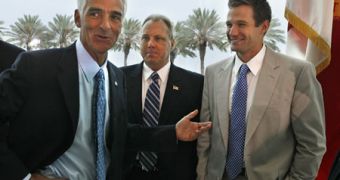The Republican presidential contenders brace themselves for tonight's debate and prepare for the 40-something questions addressed to them by the public. Should they be worried?
"If you would have taken the most-viewed questions last time, the top question would have been whether Arnold Schwarzenegger was a cyborg sent to save the planet Earth," says David Bohrman, the debate's executive producer. "The second-most-viewed video question was: Will you convene a national meeting on UFOs?"
When you take the time and think about it, or even at the first glance, he's not completely wrong not to just go with the most popular choices and set a sort of a filter, although it would be really interesting to hear the answers to some of the more "out there" questions. Despite taking it to the Internet, CNN senior vice president Bohrman thinks that the web is still too immature a medium to set an agenda for a national debate. On one hand, you have the reach and the impact that the Internet has had on the young and politically oriented youth, that will most likely be doing something in that direction in the future and that are able to deliver serious and possibly innovative solutions and questions. On the other hand, you have the kind of people that would ask if a search would be conducted to find Yeti. A random selection of questions the candidates would be asked is just not a good solution and neither is an online voting system to select the video questions for the same reason above. The more the? err? merrier.
Sarah Lai Stirland of wired.com notes that "with its YouTube collaboration, CNN is one of the first television networks to attempt to meld the televised presidential-debate format with an online social networking tool. But the news network has received a steady barrage of criticism for keeping a tight grip on the decision to select or reject particular video questions for the event."

 14 DAY TRIAL //
14 DAY TRIAL //